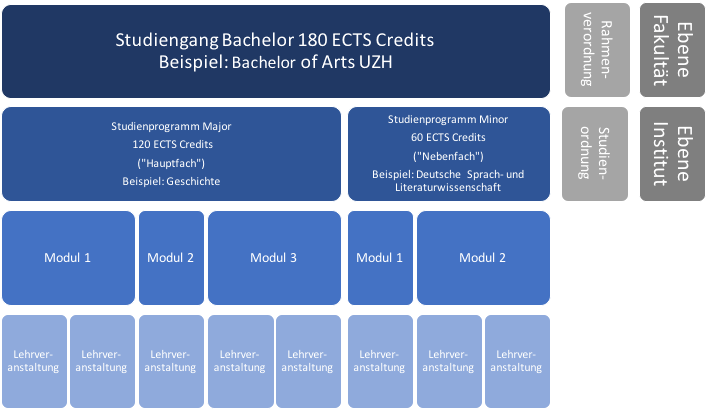I’ve Decided to Study!
How to Plan The Start of Your Studies:
How Is a Degree Course Designed?

Studying at the University of Zurich means joining the Bachelor’s degree program or the Master’s degree program, and each of these levels offer a degree programs with different content and specializations. A degree program consists of coursework with which students earn the ECTS credits they need for a Bachelor's or a Master's degree. The Bachelor’s level is the first level of the Swiss university system. At the University of Zurich, the Bachelor’s degree program always requires 180 ECTS credits, while the Master’s program can involve 90, 120, or 180 ECTS credits.
You will find an overview of the Bachelor's and Master's programs (in German only) at UZH here.
The Bachelor's level lays the groundwork for further academic work by placing a strong emphasis on methodologies and developing a scholarly approach. Students who graduate with a Bachelor's degree can continue their studies at the Master's level or work temporarily or permanently in a science field.
You choose a study program, which is an element of the degree program defined in terms of content and specialization that earns you a certain number of ECTS credits. A degree program can consist of one study program or several study programs (major and minor). Depending on the degree program, students must choose either a single-major program or full-time degree program, or a major program (in rare cases two) plus one minor program or two minor programs. The major and minor programs vary in the number of ECTS credits they offer, depending on the faculty.
A study program can require certain content areas for students to choose from and specialize in.
Every study program is allocated to one branch of studies or several branches of studies, which group the content accordingly and then define the admission requirements for the Master's level: Students with a Bachelor's degree in a particular branch of studies are admitted to the Master's study program in the same branch at any Swiss university without having to meet further requirements.
The details on a study program are included in the respective program regulations (in some cases also in the framework ordinance). The websites of the various faculties contain all the regulations. Learn more about the faculties of the University of Zurich.
The study programs are individual units of coursework made up of modules. A module (in German) can consist of one course or several courses. Every semester, students enroll in modules and put together their schedule for that semester.
How Can I Plan My Studies?
The guidelines, information sheets, and forms/templates for study programs are updated regularly and will help you answer questions about studies at an institute or in a seminar. Look for the guideline for your studies on your study program’s website for information about enrolling in modules and the design and structure of the program.
The academic advisors will answer questions you may have about the schedule and coursework, or you can contact the various student organizations.
The University of Zurich Student Association, together with the NZZ Campus, has compiled LiesDas, a study guide (in German) for starting the semester.
Funding
The following table provides an overview of the minimum monthly study and living costs at UZH. These are standard values, and living costs vary from person to person.
Expenditures |
CHF |
Tuition and fees* |
130 |
Course materials** |
100 |
Rent, including heating |
690 |
Extras (phone, internet, Billag) |
140 |
Food / cafeteria |
450 |
Health insurance***, insurance |
100 |
Transportation |
100 |
Clothing, personal care |
100 |
Leisure, pocket money |
150 |
Taxes, AHV contributions |
40 |
Students at the University of Zurich will need approximately CHF 2,000 a month in total to cover the standard costs of living and studying.
* Non-Swiss students with a foreign university entrance qualification will need CHF 210 / month at the Bachelor’s level and CHF 145 / month at the Master’s level).
** Depending on the subject area
*** After deduction of the premium discount
Source: Student Financial Aid Office
The Student Financial Aid Office is the first contact point for questions about funding your studies at the University of Zurich. The staff helps UZH students plan their budgets and coordinates financial aid and loans.
Apps
The UZH now app is your mobile companion for daily life at UZH. It offers direct access to the course catalogue and your module bookings, your personal lectures of the week or your entire semester, study results, menu plans and much more.
Exam preparations
When examinations prove to be more difficult than expected or pressure mounts because of an exclusion or from having been barred from a course or from a failed attempt, it is high time to consult the specialized literature and adjust one’s study habits. Psychological Counseling Services recommends selected literature and offers courses on managing exam anxiety and exam repetition (in German).
Parenthood and Other Questions on Work-Life Integration
The Office for Gender Equality (see the fact sheets on parenthood) has information for women and men on how to balance their studies, careers, and family commitments. Read more about childcare options, nursing rooms, and changing tables. The Foundation for Childcare in the Zurich University Area (kihz) offers services at the University of Zurich and ETH Zurich.
The Disability Office provides information, consultations, and support for people with a disability or chronic illness who study and work.